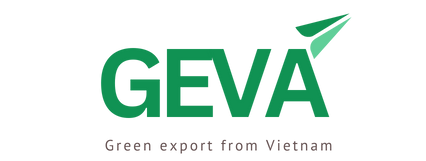quantri
Ngôn ngữ
Tabs
.
Tin tức liên quan
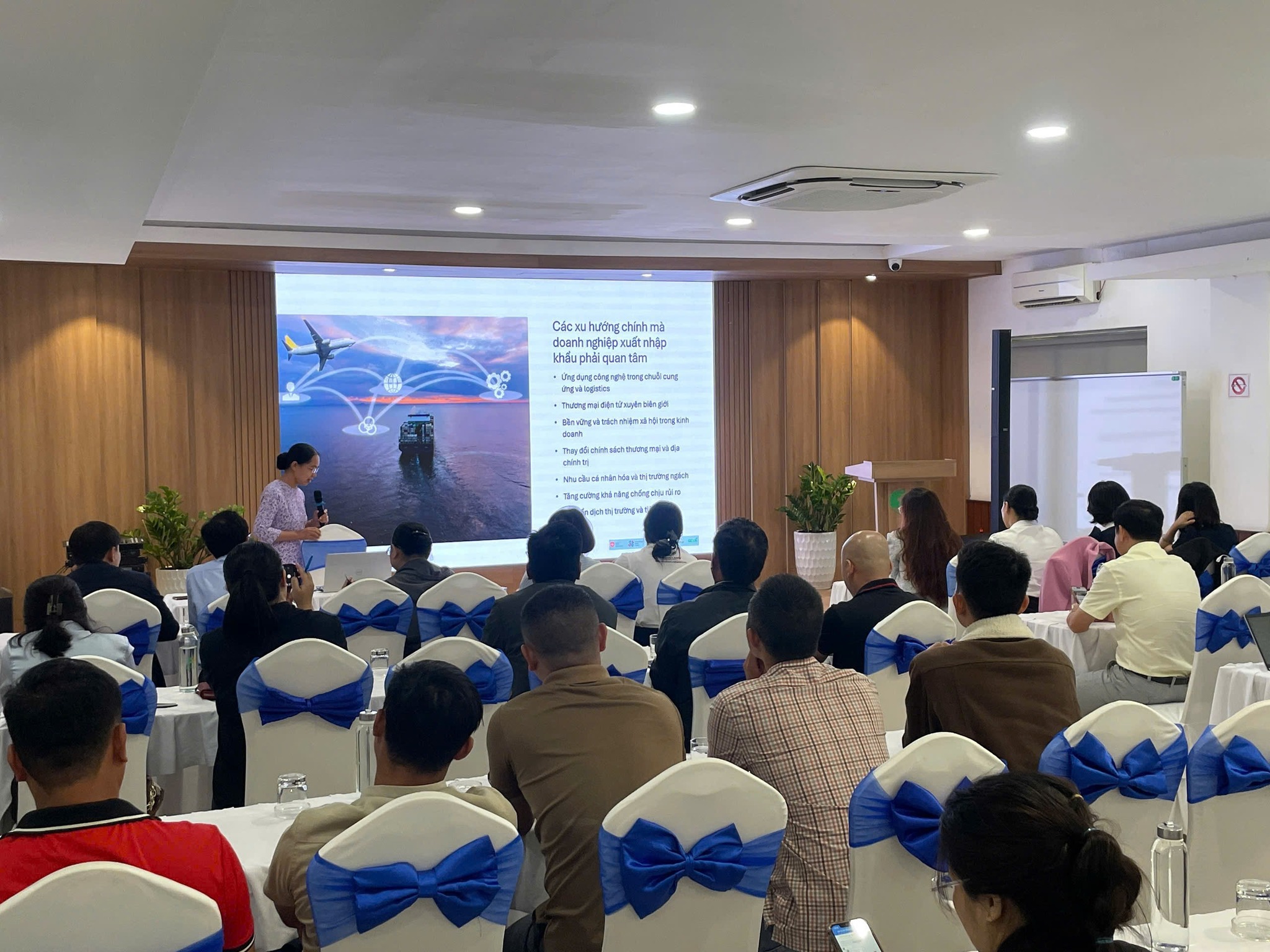
Hôm nay (24/09), dự án GEVA do KisStartup vận hành, phối hợp cùng đối tác địa phương Tavina Coffee chính thức khai mạc và tổ chức khóa đào tạo Xuất khẩu xanh dành cho 30 doanh nghiệp cà phê, tiêu, cacao tại Khách sạn Biệt Điện, Đắk Lắk.
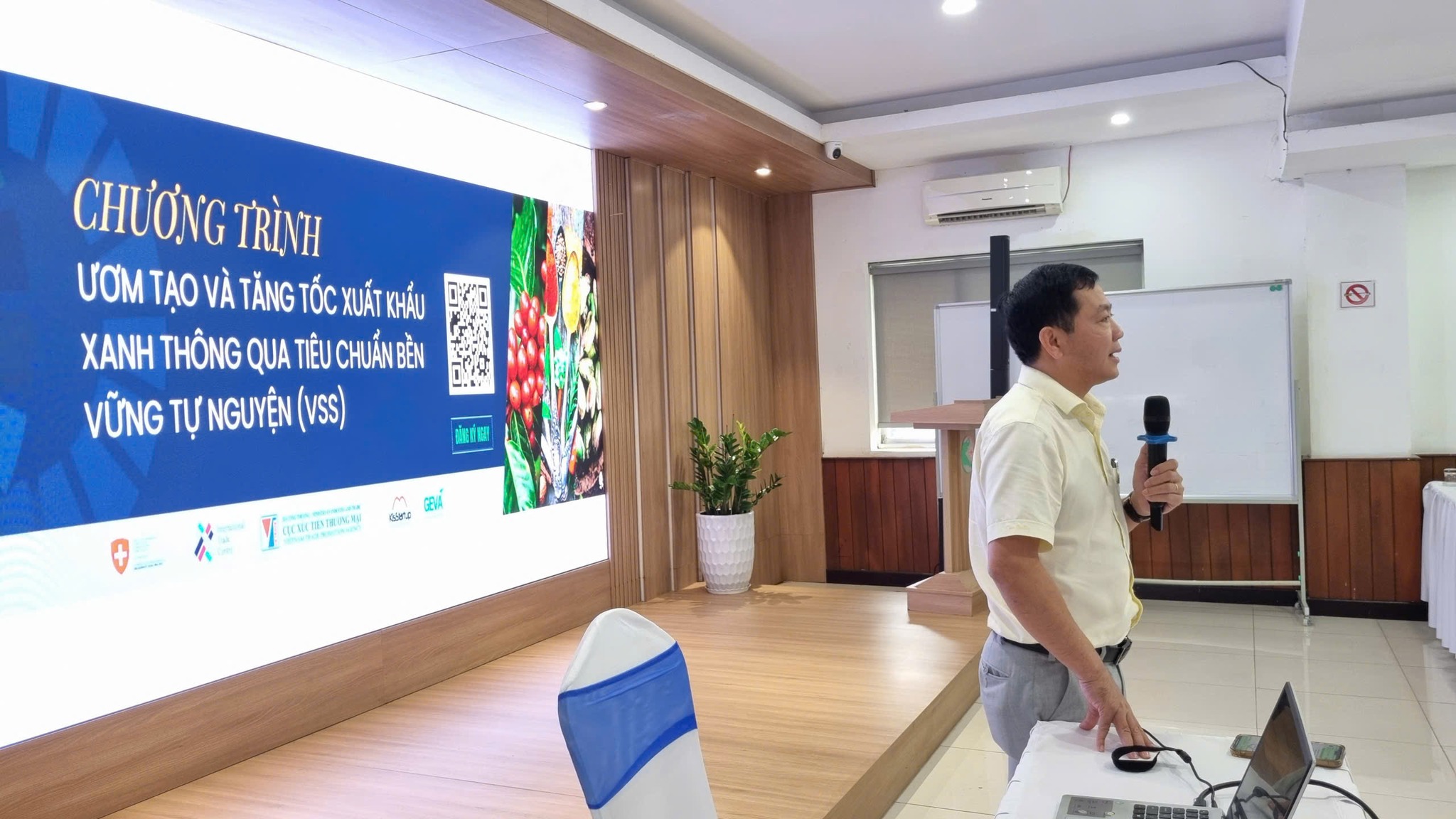
Trong 2 ngày đào tạo (24 – 25/09), doanh nghiệp sẽ được đồng hành cùng chuyên gia để hiểu rõ mô hình kinh doanh và các xu hướng xuất khẩu xanh, trực tiếp thực hành công cụ đo lường mức độ sẵn sàng xuất khẩu xanh, và đặc biệt là xây dựng kế hoạch hành động 3–6–12 tháng nhằm chuyển đổi chuỗi giá trị theo hướng xanh – bền vững – hiệu quả.
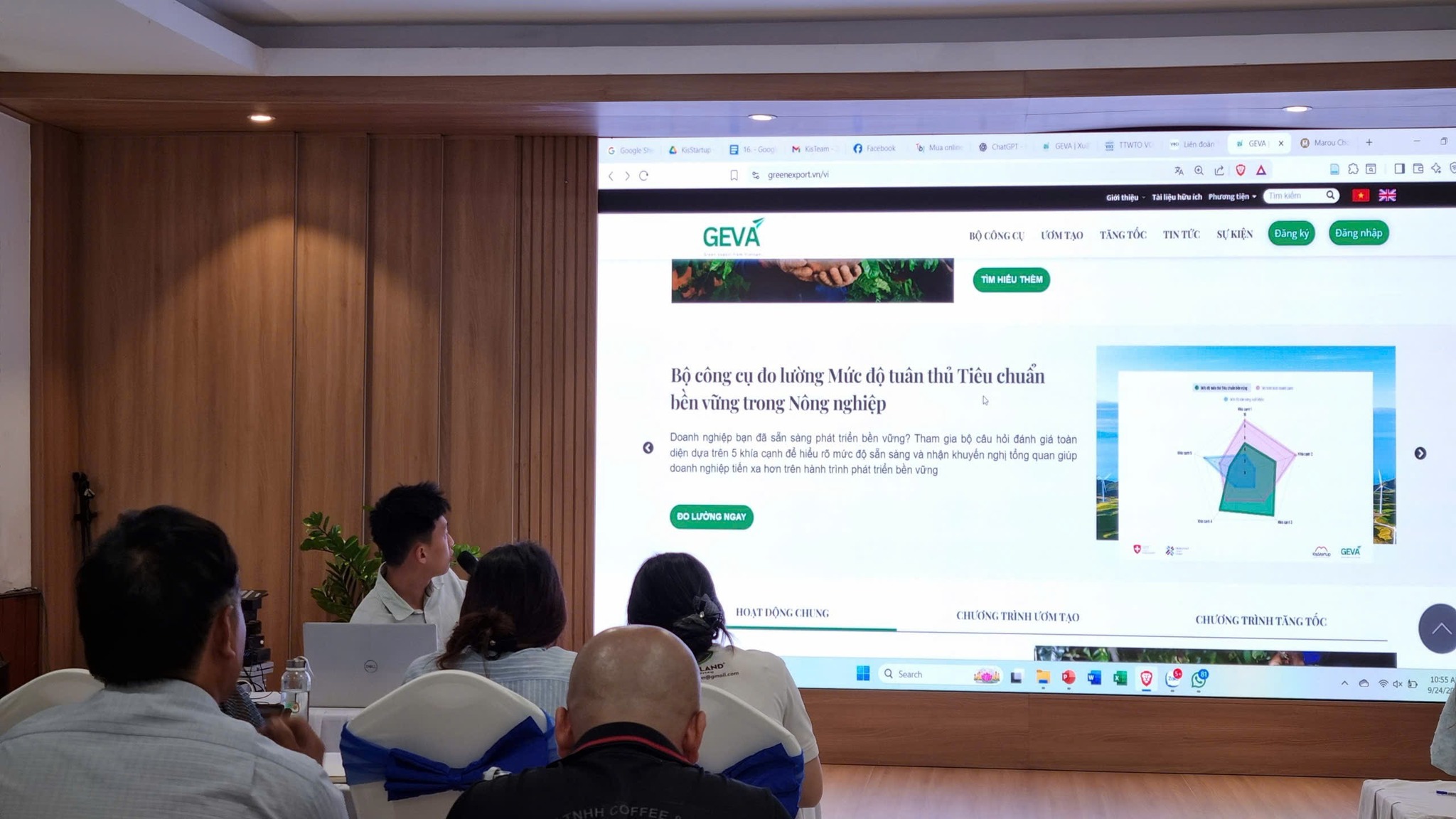
Khóa học không chỉ mang đến kiến thức thực tiễn mà còn mở ra cơ hội kết nối, chia sẻ kinh nghiệm giữa các doanh nghiệp tiên phong của ngành nông sản Tây Nguyên.
Đây là một bước quan trọng giúp doanh nghiệp Việt Nam tiệm cận các tiêu chuẩn quốc tế và nâng cao năng lực cạnh tranh trên thị trường toàn cầu.
Hãy cùng GEVA cập nhật những khoảnh khắc và bài học giá trị trong 2 ngày đào tạo tại Đắk Lắk!
--------------------------------
Về GEVA: Chương trình "Ươm tạo và Tăng tốc xuất khẩu xanh thông qua Tiêu chuẩn Bền vững Tự nguyện (VSS)" là dự án do Chính phủ Thụy Sĩ tài trợ, Tổ chức Thương mại Quốc tế (ITC) và Cục XTTM, Bộ Công thương đồng quản lý; CTCP KisStartup vận hành trong giai đoạn 4/2025 – 4/2026.
Dự án hướng tới nâng cao năng lực xuất khẩu xanh (thông qua áp dụng VSS) cho doanh nghiệp Việt Nam thông qua chuỗi hoạt động đào tạo, tư vấn, ươm tạo – tăng tốc và kết nối thị trường quốc tế nhằm đáp ứng các yêu cầu ngày càng khắt khe của thị trường toàn cầu.
----------------------------------
Mọi thắc mắc vui lòng liên hệ
Fanpage: GreenExport Vietnam
Website: https://greenexport.vn/vi
Email: hello@kisstartup.com
Liên hệ:(+84) 0392161403 (Mr. Hieu)
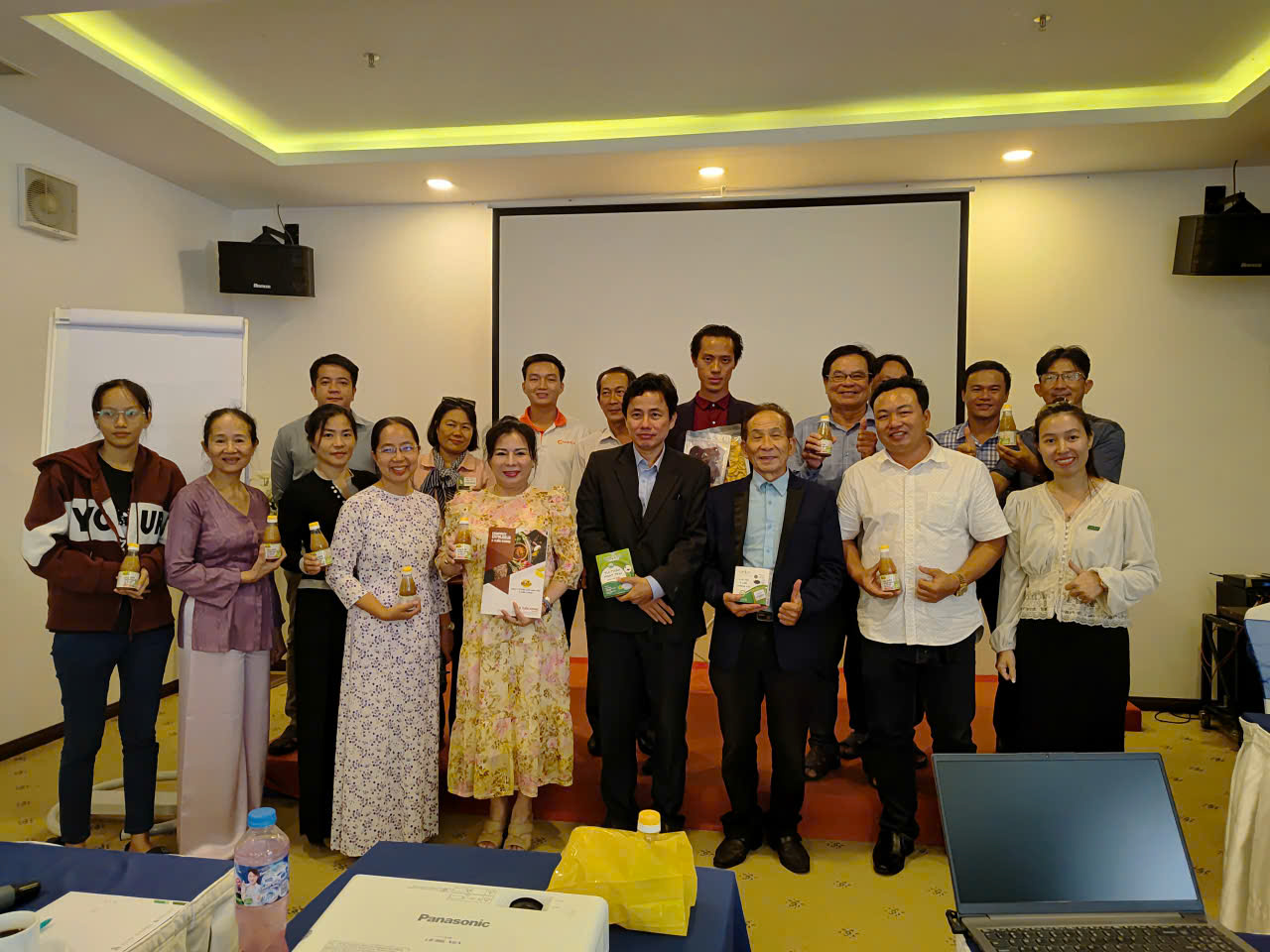
Tiếp nối chuỗi hoạt động đào tạo “Xuất khẩu xanh bền vững” đã diễn ra tại Hà Nội và Thành phố Hồ Chí Minh, chương trình GEVA tiếp tục hành trình đồng hành cùng doanh nghiệp khu vực Đồng bằng sông Cửu Long thông qua lớp đào tạo tại thành phố Bến Tre từ ngày 03 đến 05/09/2025. Đây là dịp để các doanh nghiệp, hợp tác xã địa phương được tiếp cận trực tiếp các kiến thức và công cụ cần thiết nhằm đáp ứng yêu cầu ngày càng khắt khe của thị trường quốc tế đối với sản phẩm xanh và bền vững.
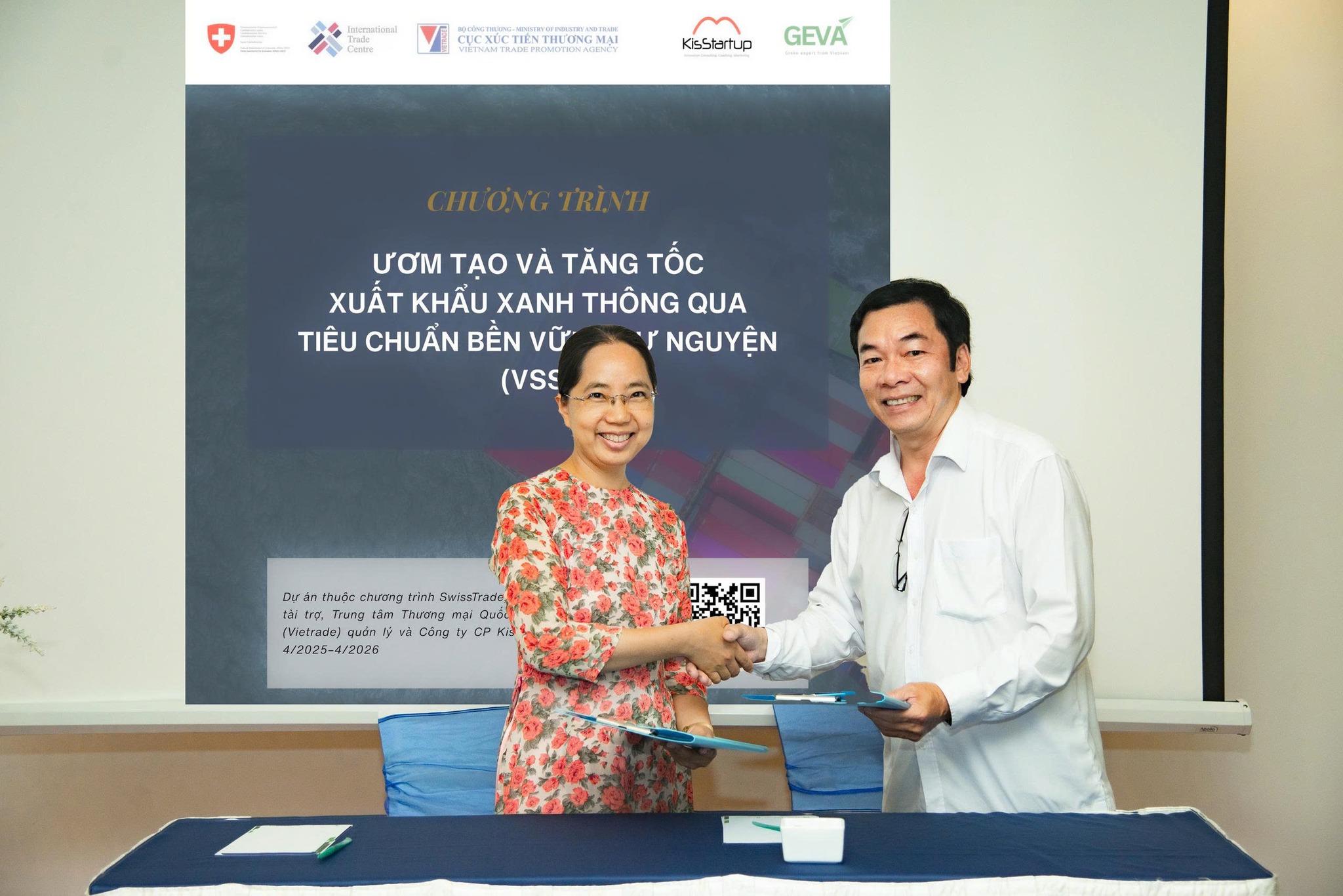
Trong lễ khai mạc, bà Nguyễn Đặng Tuấn Minh – CEO KisStartup và ông Nguyễn Khắc Hân – Giám đốc Ban Quản lý Dự án CSAT Bến Tre đã cùng ký kết Biên bản ghi nhớ, đánh dấu sự hợp tác nhằm đưa các giải pháp đào tạo và hỗ trợ thực tiễn đến gần hơn với cộng đồng doanh nghiệp địa phương. Đây là bước khởi đầu quan trọng trong hành trình đồng hành cùng doanh nghiệp chuyển đổi sang xuất khẩu xanh.
Trong 3 ngày, học viên được trang bị kiến thức và công cụ để xây dựng mô hình kinh doanh gắn với ESG và VSS, thực hành bộ công cụ đo lường mức độ sẵn sàng xuất khẩu xanh, và phát triển kế hoạch hành động cụ thể, đồng thời học cách kết nối và mở rộng hợp tác theo mô hình đối tác 4P. Các doanh nghiệp tham dự đến từ nhiều tỉnh thành khu vực Đồng bằng sông Cửu Long, hoạt động trong các lĩnh vực nông nghiệp, chế biến nông sản, thủy sản, gia vị, trái cây bản địa, thực phẩm, thủ công mỹ nghệ và ẩm thực – những ngành hàng đặc trưng và giàu tiềm năng xuất khẩu của vùng.
Điểm nhấn của chương trình là sự thay đổi tư duy theo hướng bền vững, kể câu chuyện sản phẩm dịch vụ xanh. Chuyển dịch xanh là xu hướng tất yếu. Doanh nghiệp không chỉ được chuyên gia hướng dẫn về VSS và các tiêu chuẩn xanh bền vững tự nguyện, mà còn được hướng dẫn điều chỉnh mô hình kinh doanh để phù hợp với 07 xu hướng đang tác động đến doanh nghiệp. Việc sử dụng các công cụ trí tuệ nhân tạo như ChatGPT và Perplexity để giúp doanh nghiệp có những trợ lý ảo thông minh giúp quá trình truyền thông điệp xanh đến các khách hàng. Đặc biệt chuyến tham quan HTX Bưởi Da Xanh Bến Tre, nơi học viên có cơ hội quan sát mô hình thực tiễn, lắng nghe ý kiến tư vấn từ chuyên gia, đồng thời kết nối và chia sẻ kinh nghiệm với doanh nghiệp địa phương đã cho học viên cơ hội kết nối, tìm hiểu, học kinh nghiệm. Những chia sẻthực tiễn từ HTX về quy trình, tư duy trở thành những bài học cho doanh nghiệp đang trên con đường xuất khẩu xanh.
Các doanh nghiệp tham gia đánh giá cao nội dung đào tạo thiết thực, sát nhu cầu, giúp họ định hình rõ ràng hơn lộ trình chuyển đổi xanh bền vững theo hướng tự nguyện. Đây là nền tảng quan trọng để doanh nghiệp gia tăng khả năng tiếp cận thị trường xuất khẩu, đồng thời đóng góp vào sự phát triển xanh cho địa phương. Trong thời gian tới, KisStartup sẽ tiếp tục theo dõi, hỗ trợ và đồng hành cùng các doanh nghiệp địa phương trong các hoạt động ươm tạo và xúc tiến thuộc giai đoạn kế tiếp của dự án GEVA, hiện thực hóa mục tiêu phát triển bền vững cho cộng đồng doanh nghiệp Đồng bằng sông Cửu Long.
-------------------
Về GEVA: Chương trình "Ươm tạo và Tăng tốc xuất khẩu xanh thông qua Tiêu chuẩn Bền vững Tự nguyện (VSS)" là dự án do Chính phủ Thụy Sĩ tài trợ, Tổ chức Thương mại Quốc tế (ITC) và Cục XTTM, Bộ Công thương đồng quản lý; CTCP KisStartup vận hành trong giai đoạn 4/2025 – 4/2026. Tại địa phương, dự án được triển khai với sự đồng hành của Dự án Phát triển chuỗi giá trị nông nghiệp thông minh thích ứng biến đổi khí hậu tỉnh Bến Tre (Dự án CSAT Bến Tre).
Dự án hướng tới nâng cao năng lực xuất khẩu xanh (thông qua áp dụng VSS) cho doanh nghiệp Việt Nam thông qua chuỗi hoạt động đào tạo, tư vấn, ươm tạo – tăng tốc và kết nối thị trường quốc tế nhằm đáp ứng các yêu cầu ngày càng khắt khe của thị trường toàn cầu.
----------------------------------
Mọi thắc mắc vui lòng liên hệ
Fanpage: GreenExport Vietnam
Website: https://greenexport.vn/vi
Email: hello@kisstartup.com
Liên hệ:(+84) 0392161403 (Mr. Hieu)
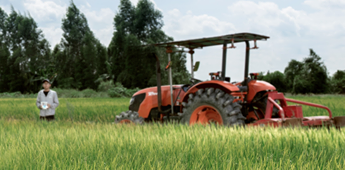
In the context of sustainable development becoming a global goal, green transformation is no longer an option but an inevitable trend. Especially with over 97% of businesses in Vietnam being small and medium-sized enterprises (SMEs), participating in this process not only enhances competitiveness but also ensures long-term development in the future.
Current Status of Green Transformation in Vietnamese Enterprises
According to a survey by the Private Sector Development Research Board (Board IV), up to 64% of Vietnamese enterprises have not implemented any actions related to green transformation. Most businesses are still in the stage of exploring the concept, without specific plans or clear solutions in place.
The main reason for this situation is the lack of investment capital — identified by 50% of businesses as the biggest challenge. In addition, other difficulties include a lack of suitable technical personnel, limited access to green technologies, scarce expert information, and challenges in meeting green credit criteria.
Digital Transformation as the Foundation, Green Transformation as the Goal
Experts suggest that green transformation is the next step in a business's development journey after digital transformation. Digital transformation acts as the foundation, enabling businesses to digitize data, automate processes, and optimize operations. With a solid foundation, businesses can effectively implement green solutions in a comprehensive and sustainable manner.
Understanding this relationship helps businesses be more proactive in adapting and better equipped to access and utilize green capital effectively, instead of passively seeking funding.
Building a Policy Ecosystem to Support Green Transformation
To ensure that green transformation happens consistently and effectively, Vietnam needs to quickly build a flexible policy ecosystem tailored to the characteristics of each type of enterprise.
First, it is crucial to establish a national Green Credit Guarantee Fund to help SMEs access preferential capital sources. At the same time, the list of green technologies eligible for import tax exemption or reduction — currently limited to only 54 items under the 2012 APEC agreement — should be reviewed and updated.
Standardizing product traceability systems through technologies such as blockchain and digital identity will enhance transparency and improve competitiveness in international markets. Moreover, support programs for green startups and innovation must be prioritized to create breakthroughs in areas like renewable energy, circular production, and sustainable agriculture.
What Should Businesses Do?
Green transformation cannot be a solo journey. Businesses need to be proactive in both mindset and action. First, they should build development strategies aligned with sustainability goals, practice green governance, and transition production processes toward environmental friendliness.
Additionally, businesses should actively seek green financing from both domestic and international sources, understand green credit criteria, and collaborate with financial institutions and support funds. Investment in technology, improving product quality, and developing socially responsible products are also essential steps.
Act Now – A Chance to Lead
This is a golden time for Vietnamese businesses to make a breakthrough by embracing and implementing green transformation. Being ahead of the curve not only boosts competitiveness but also opens doors to access demanding markets, where green standards are increasingly mandatory.
One specific support opportunity for businesses is the GEVA Project – Green Export Incubation and Acceleration Program through Voluntary Sustainability Standards (VSS), funded by the Swiss Government, managed by the International Trade Centre (ITC), and operated by KisStartup.
The project supports businesses to:
-
Self-assess capabilities through an online measurement tool
-
Participate in in-depth training programs on green exports and VSS
-
Be selected for a 6-month, customized 1:1 coaching package tailored to each business
Green transformation is an irreversible trend. The businesses that seize this opportunity will be the leaders of the future. Don’t wait — take action today to build a sustainable future for your business and for Vietnam’s economy.
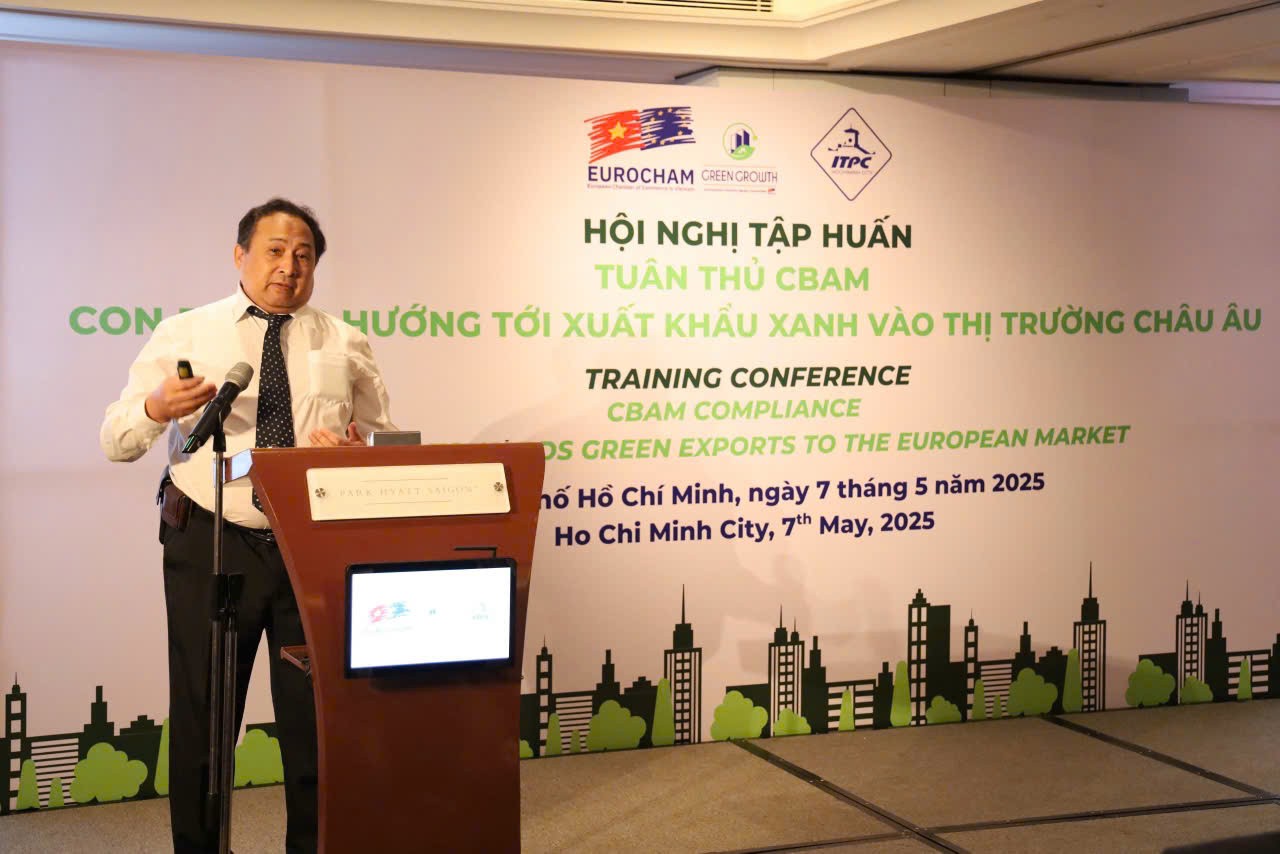

In the coming years, Vietnamese businesses, especially in agriculture, will face major challenges from EU regulations: the Carbon Border Adjustment Mechanism (CBAM) and the EU Deforestation Regulation (EUDR). These are no longer future concerns—they require immediate action.
-
CBAM: From 2026, carbon taxes will be applied to imports into the EU unless companies can transparently report emissions. Many Vietnamese SMEs lack tools to measure or report emissions, risking contract loss or high tax penalties.
-
EUDR: From 2025, exports of forest-related products (e.g., coffee, rubber, cocoa) must prove zero deforestation post-2020 and full traceability through the supply chain. Non-compliance will result in exclusion from the EU market.
Failure to adapt will not only shrink market access but also risk exclusion from global supply chains. Meanwhile, international competitors are investing early in green tech and digital traceability, widening the gap.
Call to Action: Vietnamese firms must start now—measure emissions, standardize sustainable processes, and improve transparency.
One concrete solution: GEVA Project (Green Export Acceleration through Voluntary Sustainability Standards), funded by the Swiss government and managed by ITC and KisStartup. It offers:
-
Self-assessment tools
-
Green export & VSS training
-
6-month 1-on-1 business coaching
